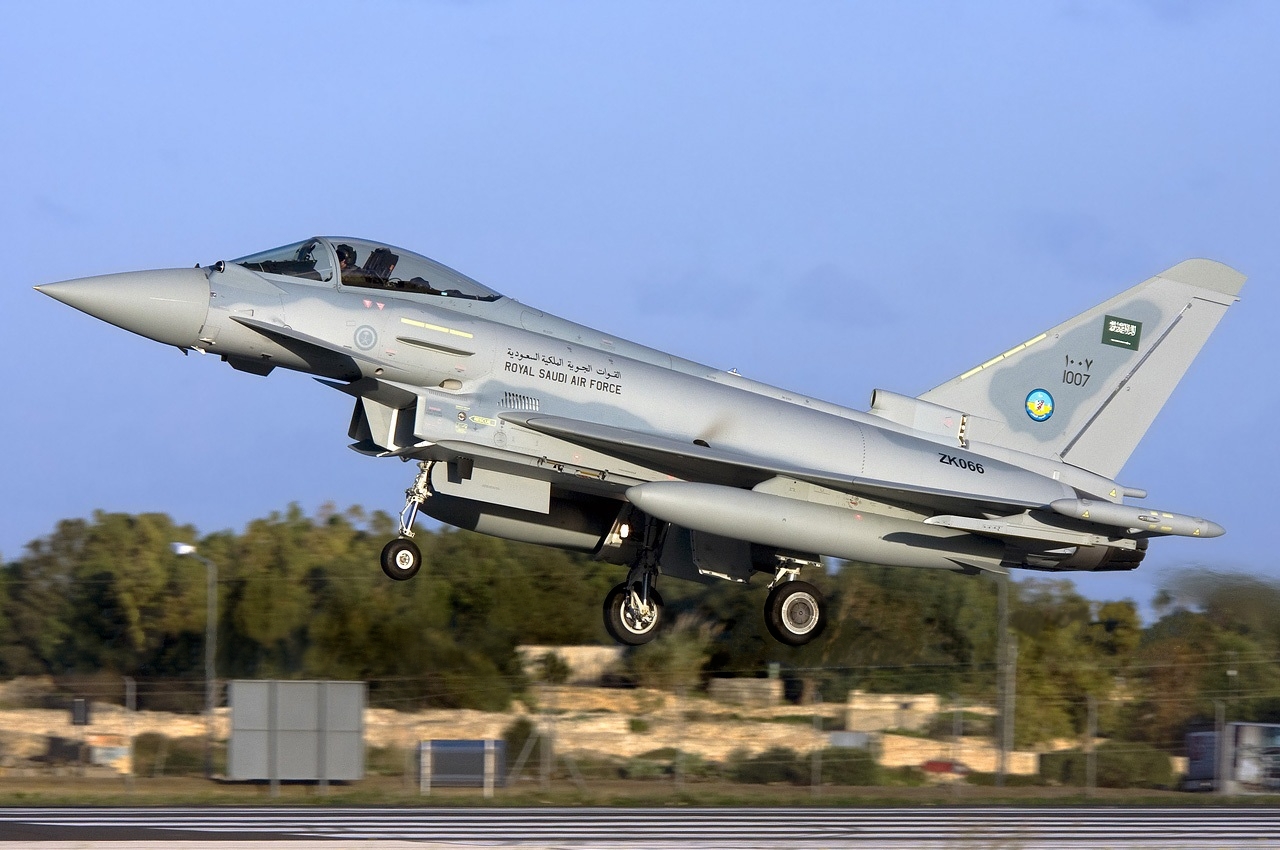There are indications that the Kingdom of Saudi Arabia (KSA) may still be interested in buying another batch of Eurofighter Typhoons from the United Kingdom (UK), despite the limbo over the last five years.
If the Kingdom wanted to purchase an additional tranche of 4.5th generation Eurofighter Typhoon fighter jets, Britain would support such a sale. There is no certainty about when the deal could be finalized.
A report by Breaking Defense stated that while the UK claims it is prepared to “fully support” a contract with the Saudis, manufacturer BAE Systems does not have any “timescale expectations” for the second tranche to proceed.
While the KSA already boasts a fleet of about 72 Eurofighter Typhoons, the two countries signed a Memorandum of Intent (MoI) five years ago in 2018 to finalize the purchase of 48 more Eurofighter jets.
However, Britain dealt a severe blow to KSA before a purchase could go through.
The UK had to suspend arms sales to KSA in 2019 after the Court of Appeal in London ruled that they were illegal and determined that the government had not adequately evaluated the risk of civilian harm. The Saudi-led coalition was then under criticism for the airstrikes in Yemen.
The British defense contractor BAE System was criticized globally for supplying military equipment to Saudi Arabia during the Yemen bombings. Media reports published in April 2020 stated that the manufacturer had sold £15 billion worth of arms and services to the Saudi military during the preceding five years.

The Saudi-UAE coalition has been fighting Iran-backed Houthi rebels in Yemen since 2015, with its human rights record frequently becoming a subject of discussion in the West.
According to reports, the coalition deployed UK-manufactured aircraft and weapons, including Eurofighter Typhoon, Tornado fighter jets, Paveway IV bombs, and Brimstone and Stormshadow missiles in the conflict.
The UK may not have entirely been against the sale of equipment to KSA. The Kingdom has been known to be the single largest market outside of BAE’s primary United States and UK markets. It accounts for 12% of BAE’s global sales, trailing only the US (43%) and the UK (20%).
In 2020, the UK legally authorized the sale of a second tranche of fighters to KSA. However, Germany refused to approve the sale owing to Turkish journalist Jamal Khashoggi’s cold-blooded murder, allegedly ordered by the Saudi crown prince, and the Kingdom’s role in the Yemen war.
Germany’s position effectively amounted to a veto over the fighter jet provided to KSA. The UK and Germany are members of a four-nation Eurofighter consortium that includes Spain and Italy. Berlin, however, changed its stance last year.
In September last, media reports suggested that the German Chancellor Olaf Scholz had approved “several deals on arms exports” before he visited the Middle East. According to the German news outlet Der Spiegel, at €36.1 million, one of those agreements allowed KSA to purchase weaponry and equipment for Tornado and Eurofighter fighter jets.
In a nutshell, with the Yemeni conflict ceasefire reducing geopolitical pressure on military sales, the UK would seem free of previous export barriers. However, KSA has been leaning towards China in recent months, a fact Western analysts have already flagged.
China Has Arrived On The Scene
As Russia and the West remain occupied in the protracted Ukraine war, China is believed to be using the opportunity to enter the Middle East. In March, it brokered a peace deal between arch-foes Saudi Arabia and Iran, which is expected to give a stronger foothold to Beijing in the region and ease tensions between the two camps.
Deepening ties, KSA also announced a US$3.6-billion deal to buy 10% of China’s Rongsheng Petrochemical, which would eventually supply 480,000 barrels per day of crude oil to the company. In addition, the two sides have bolstered their overall ties and pledged to boost military relations.
Analysts claim that Saudi Arabia and other Middle East countries seek to diversify their international alliances as the US’ competition with China and Russia grows in a more polarized world.
KSA is inching closer to joining the China-led Asian security and economic bloc, having been granted the status of a dialogue partner in the Shanghai Cooperation Organization (SCO). It helps that Saudi Arabia is China’s biggest supplier of crude, and China is the biggest buyer of Saudi oil exports.
Not just that, there have been rumors that China assisted Riyadh in establishing a nuclear program, including a “secret” yellowcake extraction factory, and in enhancing the capabilities of its solid-fuel ballistic launchers. The reports of KSA having developed a Uranium ore facility are categorically denied by Riyadh.
On top of these, China’s exhibit of its state-of-the-art weapons systems at the defense expo hosted by Riyadh in March 2022 led to speculations that big-ticket deals could be signed between the two partners.
The weapons on display included the LY-80 air defense system, the SR5 multiple rocket system, the JY-27A anti-air warning radar, the Y-9E transport aircraft, the electronic warfare defense system, and the multi-purpose unmanned boat, and multi-type drones such as the Wing Loong-2, the CH-5, and the WJ-700. However, China’s FC-31 stealth fighter jet hogged the most limelight.
Even though KSA has not shown interest in any Chinese fighter jet, its ally UAE has signed a deal with China to purchase its L-15 Light Combat Aircraft. KSA is wary that its military is predominantly composed of Western equipment, and Chinese systems may not be easy to integrate.
- Contact the author at sakshi.tiwari9555 (at) gmail.com
- Follow EurAsian Times on Google News